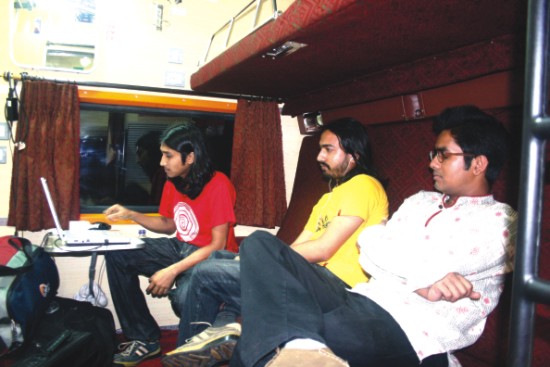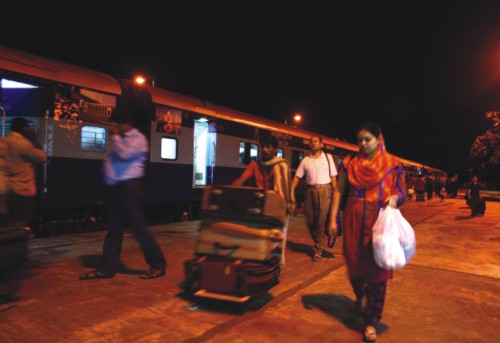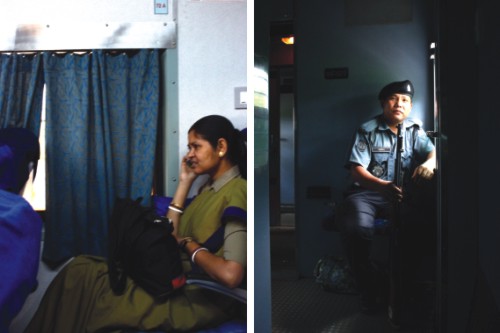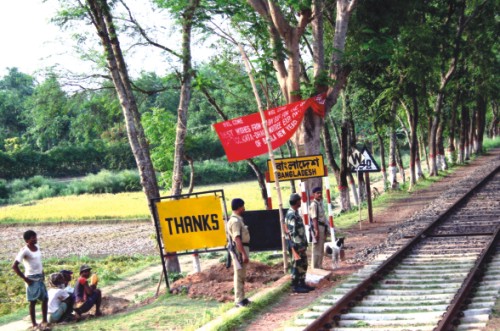| Cover Story
 An Old Route Revisited An Old Route Revisited
The train link between Dhaka and Kolkata, which was suspended 42 years ago, has been restored last month. The event has huge symbolism, for the train, rightly called Maitree (friendship) Express, will bring people of these two South Asian neighbours together. Though the quality of service is not up to international standards and the visa-checking procedure makes the journey long and laborious, and there are security concerns, the government must think of introducing more services like this that will link Dhaka with other South Asian cities such as Kathmandu and Thimpu. Bangladesh can become a communication hub; Maitree should just be the first step towards a giant long march.
Ahmede Hussain
Photos: zahedul i. khan

The linking of the two major cities Dhaka (left) and Kolkata (right) is an exciting outcome of
the new service.
Fifty-seven-year-old Beauty Rani, a resident of Dhaka's Wari area can still vividly recall the gruesome days of the partition of the Sub-continent, a time, when, she says, “Bad news was no longer news.” She lost her father in a riot, one gory morning he went to keep the family-owned shop, never to come back again. Her maternal uncles left the country to settle in newly formed India, leaving Rani's mother with the shop. The chance of a family reunion was closed shut in 1965, when in the run up to the war of 1965 between India and Pakistan the passenger rail service between Dhaka and Kolkata

The age-old gate separating the two countries |
(Calcutta) was shut down. The restoration of the service is good news for Rani, who is now toying with the idea of using it to rekindle old relationships, memories that refuse to fizzle out so easily. Feelings like hers are reciprocated on the other side of the fence. Sumana Roy, an Indian writer, sees this as an opportunity to visit her ancestral home in Pabna, a place she has only heard about from her refugee father. “The house has lived on in my memory. I have heard so much about it from my father, the lush paddy field, the river nearby--everything feels so closer to my heart”. Adyta Roy, her father, was not as lucky; he passed away a few days ago, leaving the tumultuous history of Bengal to his daughter.
Mohammad Zamir, former secretary and ambassador, thinks the restoration of direct train service between Dhaka and Kolkata is a step in the right direction. He thinks, “It will foster tourism in Bangladesh and, given that we develop proper infrastructure, it will generate a real sustainable growth in the country's tourism sector. It will eventually contribute towards the interactive engagement in areas of culture, education and healthcare.”
Sumana agrees. She thinks Bangladesh will be hugely benefited from it, as there are hundreds and thousands of Bangalis who live in her part of India who share the bonding of language and culture with the people of Bangladesh. “I have grown up hearing about Bangladesh. The Doi of Bogra and Shutki Maach of Chittagong I have only heard of but have never tasted. This opportunity I will not miss.”

Bangladeshi passengers go through customs and immigration clearance at the Gede station.
Her enthusiasm is shared by her countrymen. As IANS, an Indian news agency, has reported two days before the inauguration of the service, “It was only the second day of ticket sales for the India-Bangladesh Moitree Express and all the AC First Class tickets were sold out. Then the visa queue kept getting longer. Around 2,000 people queued outside the ticket counter for eastern railways at Fairley Place in central Kolkata.” On April 12, there have been 4, 000 Bangladeshi visa applicants lining outside the Bangladesh deputy high commissioner's office in downtown Kolkata. Like their Indian counterparts, Bangladeshis have shown keenness in using the service. A significant number of Bangladeshis travel to India to avail the country's healthcare facilities, one of them is Islam Khan Titoo. He thinks the quality of the service is not up to the mark: “We started at 8 in the morning from the Cantonment Station in Dhaka and reached the border at 2:30 in the afternoon. The train that left Dhaka, the Bangladeshi train, did not have good toilet facilities. There is only one toilet in each coach. The food was not good, and it costs 125 Tk. Even though the visa checking and other formalities on both sides took about an hour and a half, we had to wait for two and a half more hours in a waiting room for the engines to be exchanged along with the train drivers.”

A special compartment for the disabled is a welcome feature
on the Maitree Express. |
Titoo thinks there is no point in having such a waiting room, while, CR Abrar, professor of International Relations of Dhaka University, thinks the cage is unnecessary.
In fact, Pinak Ranjan Chakravarty, Indian high commissioner to Bangladesh, has informed the media a day after the inaugural run that his country and Bangladesh are seriously thinking of introducing on-board visa checking to make travel by Maitree easier. Professor Abrar welcomes it, saying, “ Any alternative arrangement that minimises the travellers' discomfort is certainly welcome.”
Mohammad Zamir, too, believes these problems can be sorted out. “As has been evident, the service has met with small hindrances related to passenger support in areas of immigration and custom clearance. I am, however, hopeful that these minor inconveniences will be ironed out,” he says. He thinks the key to the problem lies in “Careful checking of the passengers that should enable us to contain the flow of possible trafficking of persons and smuggling of drugs and illegal weapons across these frontiers.”
Another concern that some Bangladeshis have expressed is that the train service will become a one-sided affair, that there will be more Bangladeshis travelling to India than the other way round, which in economic terms means Bangladeshis will spend more in India. Abrar rubbishes such a claim. “Bangladeshis mostly go to India to avail better healthcare facilities; and I am very blunt about it. The cost of services and  unaccountability of the doctors and pathologists and others involved in our country are the factors that are driving away people to secure treatment in neighbouring countries. This should be addressed too. If the patients don't get proper treatments here they will try to get it from other places. You cannot stop that and you cannot blame anyone,” he says, “Our health sector has to regulate itself.” unaccountability of the doctors and pathologists and others involved in our country are the factors that are driving away people to secure treatment in neighbouring countries. This should be addressed too. If the patients don't get proper treatments here they will try to get it from other places. You cannot stop that and you cannot blame anyone,” he says, “Our health sector has to regulate itself.”
Abrar thinks that it is time the government takes up other outstanding issues with India like widening trade deficit and sharing of water of the common rivers. “Starting a passenger train service is a good beginning, but it should be followed up by forward movements--the governments of both the countries should think of other broader issues that have remained unresolved,” he says.
However, everyone agrees that the restoration of the train service between these two historic cities is a good sign that needs to be strengthened further. “This will facilitate the growth of trade. In this context the Saarc secretariat should also take necessary measures to activate land surface and railway service between Bangladesh and Nepal and Bhutan with the active cooperation of India,” Zamir, who travelled in the train that used to exist before 1965, says. Abrar also thinks Bangladesh can become South Asia's communication hub with train lines stretching as far away as Singapore through Sitwe (Akyab) of Myanmar and Nepal and Bhutan.

First and second class air-conditioned coacher are reasonably comfortable
Meanwhile, setting the apprehensions of the decision makers of both the countries aside, Beauty Rani in her Wari home prepares for travelling to her relatives in 24 Paragana in India, a journey that she has made so many times in her mind. She is no longer the little girl of seven that she used to be when her family members bid that fateful farewell to each other. Her hair has turned grey, ageing has taken its toll on her surely, but she is very little worried that her relatives will not be able to recognise her: “How could they not? One's own flesh and blood after all.”

Ultimate relaxation: checking mail, listening to music or just catching some shut-eye are
all part of the train experience.
From sharing of water of the common rivers to changing mindsets, Bangladesh and India have a lot of fixing to do. In the changed situation, China has emerged as an economic powerhouse, so has India. A well-connected South Asia will only usher in a world of economic prosperity and development. Our policy makers should seriously think of making the passenger train service to Kolkata as a starting point to connecting the capital to other South Asian and South East Asian cities like Kathmandu, Thimpu, Sitwe and Bangkok. Our products will become more available to these countries, which in turn, will generate growth. In this global village, connectivity is the key. Besides economic growth, it will translate into more mobility of people that will surely make South Asia a vibrant place in which to live and do business.
 |
The kitchen (left) and 'western style' toilet (right) on the train |
 |
| The starting point 'Cantonement Station' is very basic and getting public transport to go home is a major hassle. |
 |
Indian and Bangladeshi security guards |
 |
| A Bangladeshi customs officer checks fresh fruit coming in from India |

Zero point guard by BDR and BSF
Copyright
(R) thedailystar.net 2008 |
